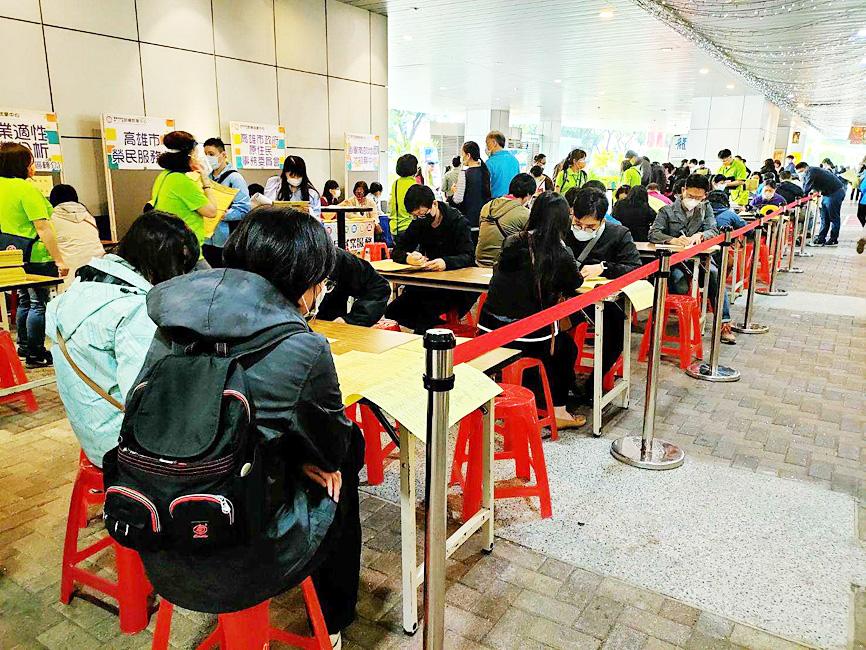A spike in COVID-19 infections appear to have had little impact on the local job market, as the number of job offers reached 1.01 million this month, growing 13 percent from January, a survey by the online 104 Job Bank (104人力銀行) showed yesterday.
The uptrend suggested vibrant hiring activity, as Taiwanese companies are upbeat about business prospects even though domestic cases of the Omicron variant of SARS-CoV-2 have exceeded 1,000 per day for the past few days, the online human resources firm said.
The development came after authorities in Taiwan focused on allowing economic activity to proceed with the least interruption, as more than 99 percent of Omicron patients display mild or no symptoms, the job bank said.

Photo courtesy of Kaohsiung Labor Affairs Bureau
The number of companies with job openings soared 30 percent from 40,000 in January to 52,000 this month, it said.
A breakdown by sector showed electronics, software and semiconductor companies with the most job vacancies at 197,000, followed by 165,000 at hospitality service providers and 147,000 at traditional manufacturers, it said.
By occupation, food and beverage attendants, machinery and equipment operators, as well as business salespeople were in high demand, with vacancies of 130,000, 112,000 and 87,000 respectively, it said.
Taiwan Semiconductor Manufacturing Co (TSMC, 台積電), the world’s largest contract chipmaker whose clients include Apple Inc and Intel Corp, has lowered its recruitment threshold from top-grade university graduates with master’s or doctorate degrees to candidates from all universities and colleges, it said.
To attract and retain talent, TSMC has reportedly offered a 10 percent pay raise for employees this year, IDC said, citing local Chinese-language media.
Similarly, chip designer MediaTek Inc (聯發科) is hiring new engineers whose wages and perks could approach NT$2 million (US$68,423) a year, it said.
However, monthly wages for low-skilled equipment operators and product packagers fall somewhere between NT$31,000 and NT$35,000 at semiconductor manufacturing facilities, the job bank said.
Those willing to work graveyard shifts might earn an extra 30 to 50 percent, it said, but added that relatively few people are willing to work graveyard shifts for health and family reasons.
Hotels, restaurants and entertainment facilities have high turnover rates and are often in need of employees, it found.
Many hospitality facilities have not yet returned to business levels prior to the COVID-19 pandemic, despite a lingering boom in domestic tourism, it said.

SEMICONDUCTORS: The German laser and plasma generator company will expand its local services as its specialized offerings support Taiwan’s semiconductor industries Trumpf SE + Co KG, a global leader in supplying laser technology and plasma generators used in chip production, is expanding its investments in Taiwan in an effort to deeply integrate into the global semiconductor supply chain in the pursuit of growth. The company, headquartered in Ditzingen, Germany, has invested significantly in a newly inaugurated regional technical center for plasma generators in Taoyuan, its latest expansion in Taiwan after being engaged in various industries for more than 25 years. The center, the first of its kind Trumpf built outside Germany, aims to serve customers from Taiwan, Japan, Southeast Asia and South Korea,

Gasoline and diesel prices at domestic fuel stations are to fall NT$0.2 per liter this week, down for a second consecutive week, CPC Corp, Taiwan (台灣中油) and Formosa Petrochemical Corp (台塑石化) announced yesterday. Effective today, gasoline prices at CPC and Formosa stations are to drop to NT$26.4, NT$27.9 and NT$29.9 per liter for 92, 95 and 98-octane unleaded gasoline respectively, the companies said in separate statements. The price of premium diesel is to fall to NT$24.8 per liter at CPC stations and NT$24.6 at Formosa pumps, they said. The price adjustments came even as international crude oil prices rose last week, as traders

POWERING UP: PSUs for AI servers made up about 50% of Delta’s total server PSU revenue during the first three quarters of last year, the company said Power supply and electronic components maker Delta Electronics Inc (台達電) reported record-high revenue of NT$161.61 billion (US$5.11 billion) for last quarter and said it remains positive about this quarter. Last quarter’s figure was up 7.6 percent from the previous quarter and 41.51 percent higher than a year earlier, and largely in line with Yuanta Securities Investment Consulting Co’s (元大投顧) forecast of NT$160 billion. Delta’s annual revenue last year rose 31.76 percent year-on-year to NT$554.89 billion, also a record high for the company. Its strong performance reflected continued demand for high-performance power solutions and advanced liquid-cooling products used in artificial intelligence (AI) data centers,

SIZE MATTERS: TSMC started phasing out 8-inch wafer production last year, while Samsung is more aggressively retiring 8-inch capacity, TrendForce said Chipmakers are expected to raise prices of 8-inch wafers by up to 20 percent this year on concern over supply constraints as major contract chipmakers Taiwan Semiconductor Manufacturing Co (TSMC, 台積電) and Samsung Electronics Co gradually retire less advanced wafer capacity, TrendForce Corp (集邦科技) said yesterday. It is the first significant across-the-board price hike since a global semiconductor correction in 2023, the Taipei-based market researcher said in a report. Global 8-inch wafer capacity slid 0.3 percent year-on-year last year, although 8-inch wafer prices still hovered at relatively stable levels throughout the year, TrendForce said. The downward trend is expected to continue this year,